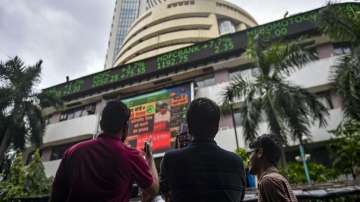The Sensex and Nifty buckled under selling pressure for the sixth session on the trot on Friday as the pre-Budget Economic Survey failed to cheer investors amid continued selling by foreign funds and a bearish trend overseas. Both the benchmark indices fluctuated between gains and losses in a highly volatile session.
The 30-share BSE Sensex crashed 588.59 points or 1.26 per cent to finish at 46,285.77 -- taking the six-session aggregate loss to 3,506.35 points or 7.04 per cent. Intra-day, the index swung 1,263.20 points.
Likewise, the NSE Nifty furthered its loss by 182.95 points or 1.32 per cent to settle at 13,634.60. Over the last six days, the NSE barometer has shed 1,010.10 points or 6.89 per cent. On the Sensex chart, 26 shares closed in the red.
Dr Reddy’s, Maruti, Bharti Airtel, Bajaj Auto, Infosys, TCS, NTPC and Bajaj FinServ were the major losers, slumping as much as 5.69 per cent.
On the other hand, IndusInd Bank, Sun Pharma, ICICI Bank and HDFC Bank ended with gains of up to 5.44 per cent.
Meanwhile, Finance Minister Nirmala Sitharaman tabled the Economic Survey 2020-21 in the Lok Sabha, ahead of the Union Budget to be presented on Monday next.
The survey projected an 11 per cent growth in the next financial year as the Indian economy makes a 'V-shaped' recovery after witnessing a pandemic-led carnage.
The Gross Domestic Product (GDP) is projected to contract by a record 7.7 per cent in the current fiscal ending March 31, 2021.
The survey also said there is likely to be fiscal slippage during the year based on the available trends for April to November 2020.
Analysts are of the view that the continued pullback in domestic markets was mainly led by profit-booking ahead of the Union Budget.
"Weakening global trend due to the concerns of speculation and slowing economic recovery has hugely impacted the cautious pre-Budget domestic market. The pace of recovery in the US and Europe has slowed down, having implication on Indian exports and FII inflows.
"In this waning domestic trend, Budget will be the key to provide strength and perform better compared to the rest of the world. Expectations are high that the government should maintain the populist and reformist agenda of maintaining the mass sentiments, deficit discipline and growth in difficult pandemic period," said Vinod Nair, Head of Research at Geojit Financial Services.
Of the 19 BSE sectoral indices, 16 closed with losses.
Among the top laggards were BSE telecom (2.97 per cent), auto (2.95 per cent), teck (2.63 per cent) and IT (2.48 per cent).
Broader BSE smallcap and midcap indices fared better than the benchmark, dropping 0.25 per cent and 0.69 per cent, respectively.
On the other hand, the large cap index tumbled 1.46 per cent.
Foreign portfolio investors (FPIs) remained in selling mode, offloading shares worth a hefty Rs 3,712.51 crore on net basis on Thursday, according to exchange data.
Elsewhere in Asia on Friday, stocks markets closed lower and also saw their worst weekly losses in months, weighed by heightened volatility in Wall Street amid a battle between retail investors and hedge funds over short positions.
On the forex market front, the rupee ended 9 paise higher at 72.96 against the US dollar on Friday.
The global oil benchmark Brent crude futures rose 0.66 per cent to USD 55.42 per barrel
Latest Business News
